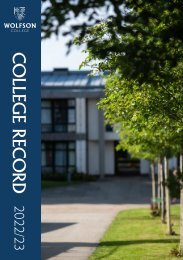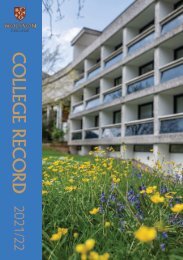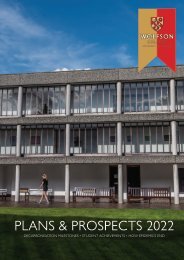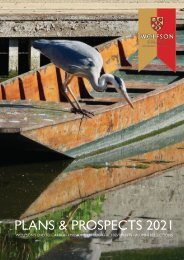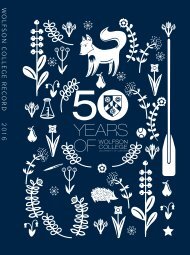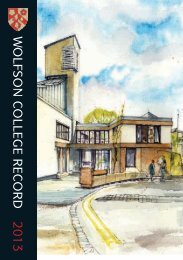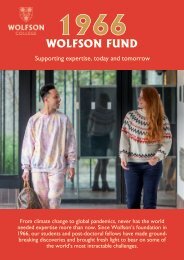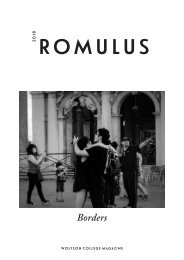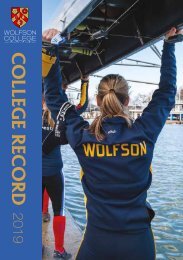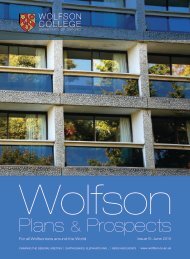Wolfson College Record 2021
Create successful ePaper yourself
Turn your PDF publications into a flip-book with our unique Google optimized e-Paper software.
Obituaries<br />
Marcus Banks<br />
(1960–2020)<br />
Research Fellow 1988–95, Governing Body<br />
Fellow 1995–<strong>2021</strong>, Vicegerent 2014–16,<br />
died on 23 October 2020. University<br />
Proctor in 2007–08, he recalled his ‘year<br />
in sub fusc’ in the <strong>Record</strong> for 2007–08.<br />
This obituary is by Richard Vokes, Associate<br />
Professor in Anthropology at the University<br />
of Western Australia.<br />
Photo: <strong>Wolfson</strong> <strong>College</strong><br />
The anthropologist Marcus Banks<br />
transformed our understanding of the possibilities for cultural representation<br />
through visual media. He also played an influential role in the wider transformation<br />
of anthropology, from a discipline once framed as a study of ‘exotic’ faraway<br />
peoples, towards one primarily concerned with the politics of social and cultural<br />
difference in the world around us.<br />
Born in Liverpool in a working-class household, where he attended New Heys<br />
Comprehensive School, Marcus went up to Christ’s <strong>College</strong>, Cambridge, in 1978<br />
to read Social Anthropology. Having taken a First, he stayed on for a PhD with<br />
Caroline Humphrey and Deborah Swallow, completing his thesis in 1985.<br />
Even at that stage, Marcus’ work was breaking new ground, his doctorate being<br />
a study of Jainism in both Jamnagar, Gujarat, and Leicester, UK. At a time when<br />
anthropology was still generally equating cultures with singular places, his study<br />
– published in 1992 as Organizing Jainism in India and England (OUP) – was<br />
an exemplar for understanding how cultural forms may be also extended and<br />
transformed across transnational fields. Methodologically, the study was an early<br />
example of what came to known as ‘multi-sited ethnography’, and – in its focus<br />
upon Leicester – of ‘anthropology at home’.<br />
However, it was at Oxford that Marcus was to make his greatest contribution.<br />
After his appointment as a ‘Demonstrator’ at the Institute of Social and Cultural<br />
Anthropology (ISCA) in 1987, he remained at that university for the rest of his<br />
life, later being promoted to Professor (2001) and Director of the School of<br />
Anthropology and Museum Ethnography (2012–16).<br />
Personal News<br />
wolfson.ox.ac.uk<br />
85



